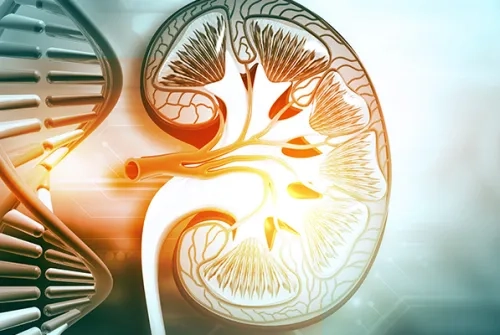Alo Yeditepe
Alo Yeditepe
Hereditary Kidney Diseases Are Underrecognized!
Kidney diseases occur in more than 500 million people throughout the world and in 1 of every 7 people in our country. Nephrology Specialist Prof. Dr. Gülçin Kantarcı, in her statement released for the "World Kidney Day", drew attention to the fact that despite the prevalence of kidney diseases, there is still not enough and accurate information about hereditary kidney diseases, which are very common both in the world and in our country.
Hereditary kidney diseases are among the leading causes of chronic kidney diseases, which are known to have a significant socioeconomic impact. Pointing out that at least 10-15 percent of the renal failure patients treated with dialysis and kidney transplantation have hereditary kidney diseases, Yeditepe University Kosuyolu Hospital Internal Medicine and Nephrology Specialist Prof. Dr. Gülçin Kantarcı stated, "A significant portion of these patients may receive a non-specific/misdiagnosis or a diagnosis of CKD of unknown etiology. This can affect the treatment method, patient follow-up and genetic counseling."
Family History Increases the Risk
Prof. Dr. Gülçin Kantarcı, Nephrology Specialist at Yeditepe University Kosuyolu Hospitals, stated that "We consider the presence of hereditary kidney disease in our patients who has kidney diseases, especially if there is a history of kidney disease among their relatives, especially if they are hemodialysis patients" and added: "Even the presence of kidney disease among their relatives is a risk factor. However, it is not proof that the cause of kidney disease is hereditary."
"All Inherited Diseases are Present from Birth"
“Hereditary diseases may present symptoms from birth, as well as in advanced ages and early childhood years. Therefore, there are two forms according to the clinical manifestation period," said Prof. Dr. Gülçin Kantarcı who gave the following information on the subject: “Actually, all hereditary diseases are present from birth. However, it is not correct to divide the clinical findings into two for every kidney disease, when our accordence is the age of onset. Some may start in two different age groups, as well as they very well may occur in the adolescent age group.
Some hereditary diseases, such as childhood polycystic kidney disease, develop when the both parents of the patient possess the related gene. These diseases, which are very rare, are clinically very severe and occur at earlier ages. In some patients, it is sufficient to have the disease-causing gene in only one of the parents. Adult type polycystic kidney disease is one of the diseases that are inherited in this way.”
“Hereditary Kidney Diseases May Be Followed by Other Diseases”
After giving the information that some hereditary kidney diseases pass according to gender, Prof. Dr. Gülçin Kantarcı reminded that there are also hereditary diseases accompanied by deafness or abnormality in the ear canal. She added that some eye diseases are also known to accompany hereditary kidney diseases as well. Prof. Dr. Gülçin Kantarcı continued her words as follows: “Functional or formal problems of the urinary bladder and urinary tract may also cause kidney diseases, and kidney diseases may develop due to problems that arise due to the location of the kidney. Each of these are either inherited or congenital kidney problems that only affect that individual. It is very important to identify the cause correctly for the right treatment for each.”
Early Diagnosis Can Prevent Kidney Failure!
Underlining that hereditary kidney diseases can cause many problems if they are not diagnosed on time and correctly, Yeditepe University Koşuyolu Hospital Nephrology Specialist Prof. Dr. Gülçin Kantarcı concluded her words as follows: “Some hereditary kidney diseases also do cause protein leakage and result in progressive kidney failure. While some inherited diseases such as Alport Syndrome, which causes blood in urine, may cause progressive renal failure, while a group of diseases, including thin basement membrane disease that begins with similar clinical findings with this syndrome, follow a milder clinical course. Diseases that cause kidney and urinary tract stones are mostly hereditary diseases. It is possible to prevent the development of kidney failure by early diagnosis and genetic detection of these diseases. Having genetic information about this disease before conceiving a child and beginning a nephrology follow-up in an earlier period can reduce the incidence of diseases and the progression to advanced kidney failure.
Press Coverage: posta | cumhuriyet | aksam | star | sondakika | haberler | aa
About
Faculty and Year of Graduation:
Uludag University Faculty of Medicine 1984-1990
”
See Also
- What is Hypoglycemia?
- Common Misconceptions About Kidney Transplantation
- Kidney Diseases and Treatment Methods
- 10 Questions About Kidney Transplantation
- How Should the Daily Salt Consumption Amount Be?
- Misconceptions About Hypertension
- Chronic Kidney Disease and Treatment Methods
- What is Hypertension?
- Things Wondered About Kidney Transplantation and Organ Donation
- If You Consume More Than 5 grams of Salt...
- The Frequency of Hepatitis Seen in Dialysis Patients Is Decreasing
- 12-Year-Old Tuğba Nur Survived with Transplant
- Excess Protein Does Not Increase Muscle Mass, and It Impairs the Kidneys
- AV FISTULA Should Be Done At The Right Time For Hemodialysis Patients
- Pay Attention to Kidneys in Pregnancy!
- He Held On To Life with His Brother's Kidney
- Recommendations to Strengthen the Immune System
- Kidney Failure Caused by Ear Obstruction
- There is Still a Lot of Misconception About Organ Donation
- He Lost 20 Kilograms in 40 Days for His Wife
- One Out of Every Seven People Has Kidney Disease
- How Should Kidney Patients Be Protected From COVID-19 Coronavirus?
- What is Propolis? How to Use Propolis?
- Improper Nutrition Invites Kidney Failure
- Important Warning from the Expert: “Not Adding Salt to Meals Alone Is Not Enough”
- Tissue Harmony Is Also Important for Success in Kidney Transplant
- Phytotherapy and Immune System
Alo Yeditepe





